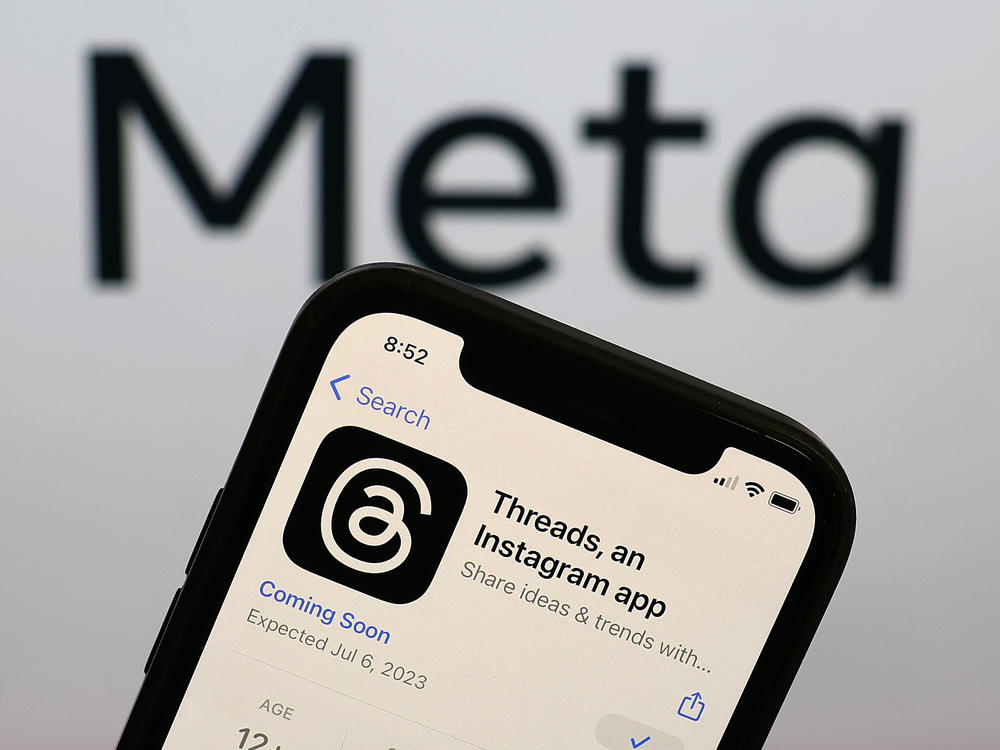Section Branding
Header Content
Meta's Threads wants to become a 'friendly' place by downgrading news and politics
Primary Content
Days after the public launch of Twitter rival Threads, Meta executive Adam Mosseri was surprisingly transparent about the company's distaste for the news media: Meta will not be doing anything to encourage hard news and politics on the platform, he wrote.
Amid Twitter's turmoil under Elon Musk, more than 100 million people have rushed to join Threads, making it the most swiftly adopted app in history.
But if Meta executives have their way, Threads will not be where people turn to debate policy issues, or catch up on local political developments and learn about breaking news that could affect their lives.
Instead, Threads is being offered as a text-version of Instagram, where celebrities, influencers and corporate brands dominate. Or as Meta chief Mark Zuckerberg put it, a "friendly" shelter from the noisy and chaotic world of news and politics.
"Will this decision make society dumber?" Solomon Messing, a former Facebook research scientist said in an interview with NPR. "Gosh, it's really hard not to say yes."
News isn't a big social media moneymaker
Messing, who is now a research professor at New York University, has published research examining how social media shapes the public's grasp of politics and news events, and how being exposed to news on social media influences someone's likelihood to vote.
The conclusion was fairly obvious.
"When folks see more political content in their news feeds, they tend to become more interested in politics," Messing said. "They tend to develop more consistent policy preferences. They tend to report voting at higher rates."
Yet to Meta, the business case is straightforward: Want a big return on investment, or ROI? Then start pushing anything other than news and politics.
Messing adds: "What's the ROI on being a politics-focused social network versus a celebrity-focused social network?"
Alex Stamos, former chief security officer at Facebook, said the company learned long ago that the news industry needs social media platforms more than the platforms need the news.
"Overall, the amount of engagement and therefore money the company makes from hard news has shown to be quite small," Stamos said.
Political drama has plenty of fans
What keeps people scrolling so persistently that it supercharges advertising revenue? "Interactions between individuals, the family photos, the influencers, things like that," he said.
Meta can turn the knobs up or down for certain kinds of content, Stamos said. For instance, Threads could de-emphasize posts that include a link to a news organization. "They'll be trying to strike the right balance between their desire to stay relevant counterbalanced with their desire to not be pulled into controversies," Stamos said.
But saying Threads is not interested in courting political drama is not going to stop it, especially with such an influx of users coming over from Twitter, which is, as Stamos put it, "effectively an intellectual gladiator coliseum. People are there to see blood on the floor."
Many of those departing Twitter because of Musk's changes to the platform are left-leaning critics of Musk who tweet obsessively about news and politics. So if Threads does not encourage discourse about politics, it might leave them without a real replacement social media app.
But can Meta really avoid the combative tenor of Twitter? It is an open question, Stamos argues, but he said Threads is kidding itself by saying it can be something of an online town square without fierce political debates.
"Whatever they're saying publicly, they clearly want to displace Twitter. And in order to do that they have to become a very important platform for political speech," Stamos said.
Meta has de-emphasized news before
In some ways, Meta's growing distance from the news industry is nothing new.
In 2016, Facebook made major changes to its algorithm to favor posts from friends and family over news articles. That decision eviscerated the traffic publishers once received from the social network.
On Instagram, major news organizations promote stories that can garner impressive engagement, but it is usually drowned out by much lighter content showing off vacations, weddings and lifestyle trends.
Then there is the Russia controversy that former Facebook employees say the company is still smarting from.
After the 2016 presidential election, American intelligence agencies found that Russian-linked disinformation campaigns created posts around divisive, hot-button topics that reached many millions in an attempt to meddle in the 2016 presidential election.
In 2020, Russia-backed groups attempted to meddle again in a presidential election by pushing conspiracy theories on social media platforms like Facebook and Twitter, but the efforts reached a far smaller audience.
Taken together, Meta executives want Threads to be a platform that makes the maximum amount of money, while steering clear of the kind of scrutiny that was heaped upon the company in the wake of the 2016 election.
But Brian Ott, a social media scholar who teaches at Missouri State University, said online platforms like Threads have a responsibility to encourage, not discourage, political debate and discussions that can influence how people engage in their communities and vote.
Ott said Meta is attempting to position Threads as an anti-Twitter Twitter, when in fact it is essentially a clone service.
"What Meta is engaged in right now is a marketing effort to try to tell people, 'hey this isn't going to be what happened last time,' well, in fact, it is going to be what happened last time," Ott said. "It's going to be exactly what happened last time. Because the fundamental technology hasn't changed."
Copyright 2023 NPR. To see more, visit https://www.npr.org.

